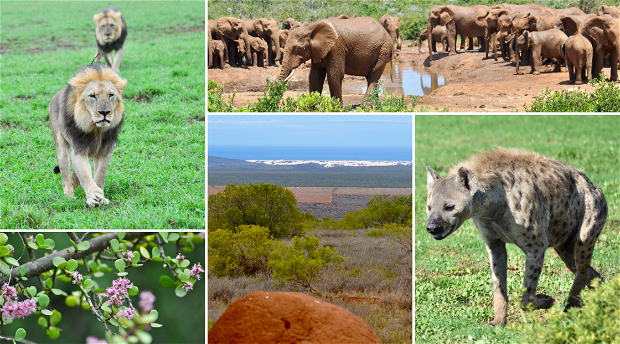Explore Table Mountain, Cape Town's iconic landmark and a UNESCO World Heritage site. Discover the history behind its unique flat-topped appearance and its status as one of the New7Wonders of Nature. Learn about the thrilling cable car rides offering panoramic views, and the adventurous hiking trails through diverse fynbos vegetation. Encounter Table Mountain's rich biodiversity, including the elusive Table Mountain ghost frog. Whether you're a nature enthusiast or a history buff, Table...
Visitors Guide About Addo Elephant Park, South Africa

Addo Elephant National Park is a must-visit destination for nature and adventure enthusiasts—and home to the famous Big 7. As a South African tour operator, we've compiled a list of the top facts about this incredible park.
Discover Addo Park's Fun Facts :
Experience an Unforgettable Holiday in South Africa's Eastern Cape
Looking for a destination that will leave an indelible impression? Look no further than South Africa's Eastern Cape! There is something for everyone, from nature lovers to adventure seekers. The Addo Elephant National Park and Greater Addo near Port Elizabeth are just some attractions you must see. This world-renowned park is one of the best places to witness African wildlife in their natural habitat. With over 1,640 km² of area, it is now the third-largest national park in South Africa.
The Addo Elephant National Park is a South African wildlife reserve near Port Elizabeth, a thriving national park with five distinct biomes that allow various wildlife to flourish. This park is the only one in the world with "the Big 7" - lions, leopards, black rhinos, cape buffalos, the majestic Addo elephant, great white sharks and southern right whales. While you're there, watch for the unique and rare Addo flightless dung beetle.
Despite being on the brink of extinction due to ivory hunting in the early 1900s, the area now flourishes thanks to the Addo Elephant National Park proclamation established in 1931 to protect the dwindling elephant population. Since then, the park has expanded to cover a range of species and habitats, from savannah to coastal forests.
- Wildlife: Addo Elephant National Park is home to various animals, including elephants (of course!), lions, zebras, buffalo, and more.
- Conservation: The park is an important conservation area, working to protect endangered species and preserve natural habitats.
- Safari: Many visitors come to Addo to go on a safari and see the park's incredible wildlife up close.
- History: Addo Elephant National Park has a rich history, including its establishment in 1931 to protect a small population of elephants in the area.
- Activities: Beyond safaris, the park offers a range of activities for visitors, including hiking, horseback riding, and birdwatching.
- Location: Addo Elephant National Park is located in the Eastern Cape province of South Africa, not far from Port Elizabeth and other popular tourist destinations.
- Accommodation: Visitors can stay at various accommodations within the park, from campsites to luxury lodges, making it accessible to various travellers.
Here are 30 interesting facts about the fauna, flora, weather, and history of the Addo Elephant National Park:
- The park is home to over 600 elephants, the largest population of elephants in South Africa.
- The park is also home to lions, black rhinos, buffalo, leopards, hyenas, zebras, and various antelope species.
- The park is also home to over 400 species of birds, making it a popular destination for bird watchers.
- The park has five different biomes: Albany Thicket, Forest, Fynbos, Nama Karoo, and Succulent Karoo.
- The park is home to several endemic species, including the Addo flightless dung beetle and the Addo elephant shrew.
- The park has over 1800 plant species, including several aloe species and succulents.
- The park's vegetation is adapted to the region's Mediterranean climate, with hot, dry summers and cool, wet winters.
- The park receives an average of 450mm of rainfall per year.
- The park is located near the coast, which moderates the temperature and prevents extreme heat or cold.
- The park's history dates back to the 1700s when Dutch settlers first arrived.
- The park was initially established to protect the remaining elephants, hunted to near extinction.
- The park was expanded in the 1950s to protect other wildlife species.
- In 2003, the park was expanded again to include a marine protected area, which protects the nearby islands and their marine life.
- The park is now over 180,000 hectares in size.
- The park is managed by South African National Parks (SANParks).
Visitors to the park can go on guided game drives, self-guided tours, or hiking trails. - The park has several picnic areas and braai (barbecue) facilities for visitors.
- The park has several accommodation options, including campsites, chalets, and luxury lodges.
- The park is a popular destination for eco-tourists and nature enthusiasts.
- The park's conservation efforts have successfully increased the populations of several endangered species, including the black rhino and the Cape mountain zebra.
- The park has several research and monitoring programs which study the park's ecology and wildlife.
- The park's conservation efforts have also focused on reducing human-wildlife conflict by developing electrified fences and other measures to protect nearby communities from wild animals.
- The park is near several popular tourist destinations, including Port Elizabeth and the Garden Route.
- The park has several cultural heritage sites, including the remains of a San rock shelter and a historic farmhouse.
- The park's main entrance is located near Addo, which is named after the original Khoikhoi inhabitants of the area.
- The park has several natural water sources, including the Zuurberg Mountains and the Sundays River.
Rolling hills, rocky outcrops, and open plains characterize the park's landscape. - The park is located in a malaria-free zone.
- The park has several environmental education programs, which teach visitors about the park's ecology and conservation efforts.
- The park's motto is "Conservation in Action", reflecting its commitment to protecting the natural environment and wildlife.
- Addo Elephant National Park is home to over 400 bird species, including the brightly coloured Lilac-breasted Roller.
- The park is also home to various antelope species, including kudu, eland, and bushbuck.
- The park's marine reserve is home to the world's largest breeding colony of Cape gannets, with over 160,000 birds.
- The park is known for its unique and ancient cycad trees some of the world's oldest plants.
- The park is also home to over 100 species of reptiles, including the endangered geometric tortoise.
- The park offers visitors a range of activities, including game drives, hiking trails, 4x4 trails, and guided horseback safaris.
If you're interested in a safari tour, consider booking a half-day or full-day tour through a local travel company. Game viewing is done in a closed tour vehicle, ensuring a safe and comfortable experience. And if you're up for an adventure, why not take a chartered boat vessel to explore the marine section of the park? You'll see St Croix Island, home to the largest African penguin breeding colony in South Africa and other nearby islands.
Further Reading
Discover Cape Town, the Mother City of South Africa, through our ultimate guide. From iconic attractions like Table Mountain and the Cape Peninsula to thrilling adventures such as shark cage diving and hot air ballooning, immerse yourself in the city's rich cultural tapestry with dining tips, family-friendly activities, and practical travel advice. Whether you're planning your first trip or looking to enhance your experience, our guide ensures you make the most of...
Planning a trip to Cape Town? Explore a range of accommodation options from budget-friendly hostels and charming guest houses to luxurious hotels and unique boutique stays. Our comprehensive guide provides direct links to each establishment, making it easy to find the perfect place to stay in this vibrant South African city. Discover your ideal accommodation and make the most of your Cape Town experience with comfort and convenience.



Share This Post